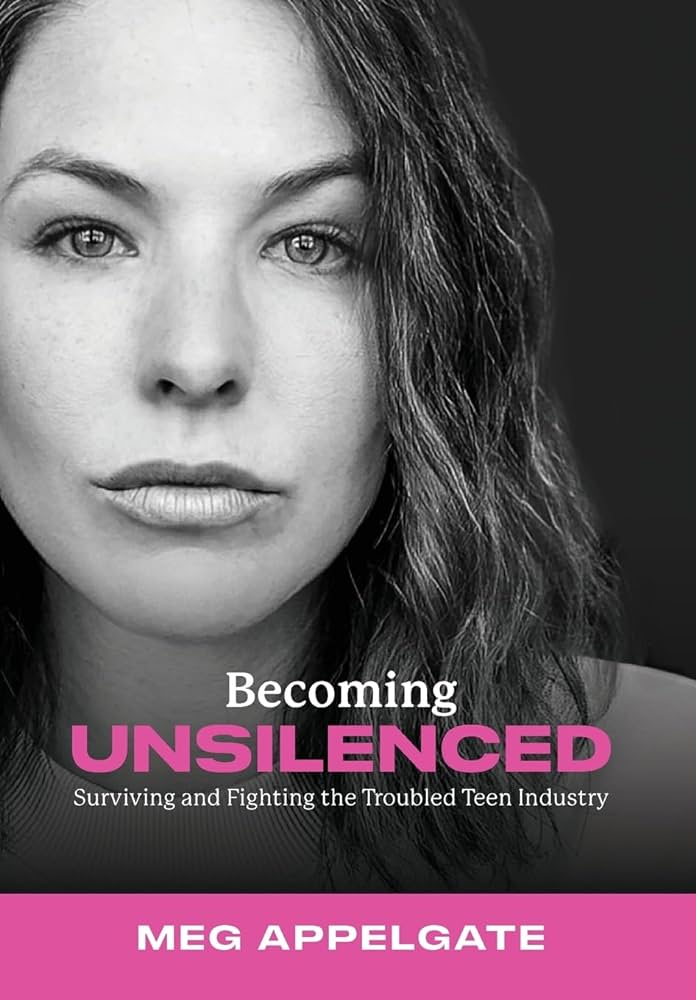We’ve left it open for you, so you don’t even need one of those little keys. Because writing is life, and keeping it real means forgoing the line between the personal and the professional.
Clients Crushin’ It: Meg Appelgate
Madison Utley speaks to first-time author Meg Appelgate about her memoir, Becoming Unsilenced: Surviving and Fighting the Troubled Teen Industry, and how she was able to find her voice after years of being told she couldn’t possibly have anything important to say.

Q: When you reached out to Stuart, you weren’t confident that you had a book. What about those initial conversations convinced you that you did, and that this was the time for it to be written?
A: It was definitely on our first call. I realized that someone who knew relatively little about the troubled teen industry and its effects on the youth who enter it still cared a lot about my story. Survivors are programmed to believe that we aren’t worthy, so Stuart’s response to what I had to say helped counteract the inner narrative that tells me that nothing I do will ever be important.
Q: In the book, you share about your TTI experience of being “reprogrammed” and intentionally given confidence issues, and yet the voice you bring to this work is so strong and clear; how did you discover that voice? How did you learn to trust it?
A: First, I had to learn how to put what I was feeling into words. Figuring out how to label my feelings was particularly hard because I had been intellectualizing my emotions for so long while masking my autism. Once I let myself feel my feelings for what they were, I then had to process them. During that time I felt angry, and anger can do some pretty powerful things and really energize you, and that propelled me for a while even though I still didn’t have all that much self confidence. However, once I saw that the things I was doing were actually creating change, my confidence began to grow and that newfound self-validation has enabled me to believe that my voice deserves to be heard–as does every survivor’s.
Q: How did working with Stuart help in that process of discovering and refining your voice?
A: Deciding to write a book is so intimidating. I let that get the best of me in the beginning, and I really relied on Stuart. I had no idea what I wanted out of this, or how to organize all of my thoughts we put down on paper. Then, there was a big shift once I saw the first draft. It provided me with a basic understanding of where the different things that I talked about were going to go. Stuart did a really good job of creating that framework.
That framework got me excited. Things didn’t feel so daunting anymore because it was starting to look like a book. I wrote pages and pages of additional material and made suggestions to refine my voice between drafts. Stuart had done an incredible job, but all of a sudden I had this need to fully become unsilenced and make it sound exactly like me.
At that point I started gaining a lot of confidence in my ability to shape what was happening. Over the course of the year we worked together, through the draft process, the manuscript really changed into what it was supposed to be. Without having Stuart to help guide me through this process, especially in the beginning stages, it felt so scary; but now I’ve not only decided I want to write another book, I feel confident I can do so.
Q: Who do you most hope reads this book?
A: There are a lot of people I believe would benefit from reading this book, but first and foremost, I hope my story reaches any and every survivor. I had what I consider to be a very traumatic experience and I’m writing to bolster other survivors who might feel like because they didn’t have it as bad as other people out there, they shouldn’t be traumatized. Trauma is trauma is trauma. Just because some forms leave bruises and others don’t doesn’t mean anyone’s story is more or less valuable. I really hope this book brings that message to the people who need to hear it, and delivers a sense of validation and hope.

Leave a Reply